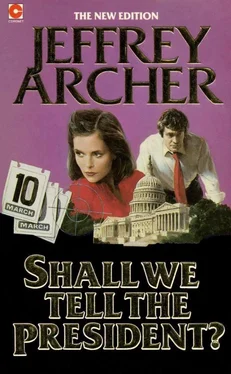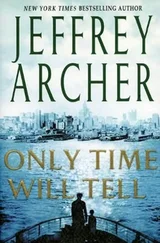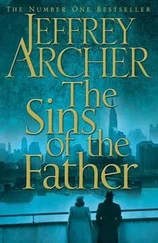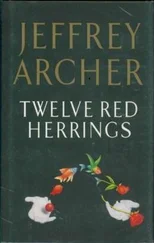The phone clicked. Mark called Aspirin, what a night for him to have to be on duty, told him about Stames and Calvert, hanging up abruptly before Aspirin could ask any questions. He returned to his car and drove home slowly through the night. There was hardly another car on the streets and the early-morning mist gave everything an unearthly look.
At the entrance to his apartment garage he saw Simon, the young black attendant, who liked Mark and, even more, Mark’s Mercedes. Mark had blown a small legacy from his aunt on the car just after graduating from college, but never regretted his extravagance. Simon knew Mark had no assigned spot in the garage and always offered to park his car for him — anything for a chance to drive the magnificent silver Mercedes SLC 580. Mark usually exchanged a few bantering words with Simon; tonight he passed him the keys without even looking at him.
“I’ll need it at seven in the morning,” he said, already walking away. “Okay, man,” came back the reply.
Mark heard Simon restart the car with a soft whoosh before the elevator door closed behind him. He arrived at his apartment; three rooms, all empty. He locked the door, and then bolted it, something he had never done before. He walked around the room slowly, undressed, throwing his sour-smelling shirt into the laundry hamper. He washed for the third time that night and then went to bed, to stare up at the white ceiling. He tried to make some sense out of the night’s events; he tried to sleep. Six hours passed, and if he slept it was never for more than a few minutes.
Someone else who didn’t sleep that night for more than a few minutes was tossing and turning in her bed at the White House.
Abraham Lincoln, John F. Kennedy, Martin Luther King, John Lennon and Robert Kennedy. How many citizens distinguished and unknown needed to sacrifice their lives before the House would pass a bill to outlaw such self-destruction?
“Who else must die?” she remarked. “If I myself there is no hour so fit as...”
She turned over and looked at Edward whose expression left no doubt that such morbid thoughts were not on his mind.
6:27 A.M.
Eventually Mark could stand it no longer and at 6:30 A.M. he rose, showered, and put on a clean shirt and a fresh suit. From his apartment window, he looked out across the Washington Channel to East Potomac Park and went over in his mind all that had happened yesterday. In a few weeks the cherry trees would bloom. In a few weeks...
He closed the apartment door behind him, glad simply to be on the move again. Simon gave him the car keys; he had managed to find a space for the Mercedes in one of the private parking lots.
Mark drove the car slowly up 6th Street, turned left on G and right on 7th. No traffic at this time of morning except trucks. He passed the Hirshhorn Museum as he crossed into Independence Avenue. At the intersection of 7th and Pennsylvania, next to the National Archives, Mark came to a halt at a red light. He felt an eerie sense of nothing being out of the ordinary, as though the previous day had been a bad dream. He would arrive at the office and Nick Stames and Barry Calvert would be there as usual. The vision evaporated as he looked to his left. At one end of the deserted avenue, he could see the White House grounds and patches of the white building through the trees. To his right, at the other end of the avenue, stood the Capitol, gleaming in the early morning sunshine. And between the two, between Caesar and Cassius, thought Mark, stood the FBI Building. Alone in the middle, he mused, the Director and himself, playing with destiny.
Mark drove the car down the ramp at the back of FBI Headquarters and parked. A young man in a dark blue blazer, gray flannels, dark shoes, and a smart blue tie, the regulation uniform of the Bureau, awaited him. An anonymous man, thought Mark, who looked far too neat to have just got up. Mark Andrews showed him his identification. The young man led him towards the elevator without saying a word; it took them to the seventh floor, where Mark was noiselessly escorted to a small room and asked to wait.
He sat in the reception room, next to the Director’s office, with the inevitable out-of-date copies of Time and Newsweek; he might have been at the dentist’s. It was the first time in his life that he would rather have been at his dentist’s. He pondered the events of the last fourteen hours. He’d gone from being a man with no responsibility enjoying the second of five eventful years in the FBI to one who was staring into the jaws of a tiger. His only previous trip to the Bureau itself had been for his interview; they hadn’t told him that this could happen. They had talked of salaries, bonuses, holidays, a worthwhile and fulfilling job, serving the nation, nothing about immigrant Greeks and black postmen with their throats cut, nothing about friends being drowned in the Potomac. He paced around the room trying to compose his thoughts; yesterday should have been his day off, but he had decided he could do with the overtime pay. Perhaps another agent would have got back to the hospital more quickly and forestalled the double murder. Perhaps if he had driven the Ford sedan last night, it would have been he, not Stames and Calvert, in the Potomac. Perhaps... Mark closed his eyes and felt an involuntary shiver run down his spine. He made an effort to disregard the panicky fear that had kept him awake all night — perhaps it would be his turn next.
His eyes came to rest on a plaque on the wall, which stated that, in over sixty years of the FBI’s history, only thirty-four people had been killed while on duty; on only one occasion had two officers died on the same day. Yesterday made that out-of-date. Mark’s eyes continued moving around the wall and settled on a large picture of the Supreme Court; government and the law hand-in-hand. On his left were the five directors, Hoover, Gray, Ruckelshaus, Kelley, and now the redoubtable H. A. L. Tyson, known to everyone in the Bureau by the acronym Halt. Apparently, no one except his secretary, Mrs. McGregor, knew his first name. It had become a longstanding joke in the Bureau. When you joined the FBI, you paid one dollar to Mrs. McGregor, who had served the Director for twenty-seven years, and told her what you thought the Director’s first name was. If you got it right, you won the pool. The kitty had now reached $3,516. Mark had guessed Hector. Mrs. McGregor had laughed and the pool was one dollar the richer. If you wanted a second guess, that cost you another dollar, but if you got it wrong, you paid a ten-dollar fine. Quite a few people tried the second time and the kitty grew larger as each new victim arrived.
Mark had had what he thought was the bright idea of checking the Criminal Fingerprints File. The FBI fingerprints records fall into three categories — military, civil, and criminal, and all FBI agents have their prints in the criminal file. This insures that they are able to trace any FBI agent who turns criminal, or to eliminate an agent’s prints at the scene of a crime; these records are very rarely used. Mark had considered himself very clever as he asked to see Tyson’s card. The Director’s card was handed to him by an assistant from the Fingerprints Department. It read — “Height: 6’1”; Weight: 1801bs; Hair: brown; Occupation: Director of FBI; Name: Tyson, H.A.L.” No forename given. The assistant, another anonymous man in a blue suit, had smiled sourly at Mark and had said, loud enough for Mark to hear, as he returned the card to its file, “One more sucker who thought he was going to make a quick three thousand bucks.”
Because the Bureau had become more political during the last decade the appointment of a professional law enforcement officer was a figure whom Congress found very easy to endorse. Law enforcement was in Tyson’s blood. His great-grandfather had been a Wells Fargo man, riding shotgun on the stage between San Francisco and Seattle in the other Washington. His grandfather had been mayor of Boston and its chief of police, a rare combination, and his father before his retirement had been a distinguished Massachusetts attorney. That the great-grandson had followed family tradition, and ended up as Director of the Federal Bureau of Investigation, surprised no one. The anecdotes about him were legion and Mark wondered just how many of them were apocryphal.
Читать дальше












